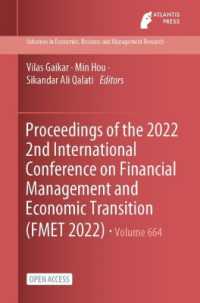- ホーム
- > 洋書
- > 英文書
- > Philosophy
Full Description
In a departure from standard approaches to the concept of liberty, in this book John Christman locates and defends the concept of freedom as a fundamental social value that arose out of fights against slavery and oppression. Seen in this light, liberty must be understood as requiring more than mere non-interference or non-domination - it requires the capacity for self-government and the capabilities needed to pursue valued activities, practices, and ways of life. Christman analyses the emergence of freedom as a concept through nineteenth- and twentieth-century struggles against slavery and other oppressive social forms, and argues that a specifically positive conception best reflects its origins and is philosophically defensible in its own right. What results is a model of freedom that captures its fundamental value both as central to the theoretical architecture of constitutional democracies and as an aspiration for those striving for liberation.
Contents
Introduction; Part I. Methodology and a Shift in Perspective: 1. Theorizing freedom in the non-ideal World; 2. Lessons from slavery; Part II. Reconstructing the Concept of Freedom: 3. From History to Philosophy; 4. Freedom and social practices; 5. Freedom and capabilities; 6. Self-Government; 7. Social recognition; Part III. Conclusions and Applications: 8. Freedom, value, justice; Conclusion: liberty, democracy, and the persistence of unfreedom; Bibliography; Index.








